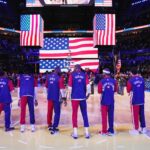
NBA commissioner Adam Silver is suggesting a change to the All-Star Game format. To increase competitiveness and restore the spirit of the annual exhibition, the NBA is considering switching to a format that pits the best U.S.-born players against the best international players: USA vs. World.
It’s a workable concept that may not have been proposed in years past.
However, due to the influx of foreign-born talent, it’s a legitimate possibility. After all, the best player in the NBA might be a Serbian center. The reigning MVP is a Cameroonian center. This season’s MVP may be a Canadian point guard. The 2023-24 Defensive Player of the Year will almost certainly be a French big man.
In the 2024 All-Star Game, seven of the 24 selections were international players. That is if counting Minnesota Timberwolves big man Karl-Anthony Towns, a New Jersey native who plays for the Dominican national team. With Miami Heat center Bam Adebayo playing for Team USA despite his Yoruba roots, the league may not though.
Con — Not Enough International All-Stars
Therein lies the first potential problem with Silver’s plan. The NBA may not want to force a player to claim another country, especially in a country that espouses freedom of choice as one of its greatest principles.
Yet, there may not be 12 international players worthy of an All-Star selection. Even now, at the height of their prominence, they may only field one-half to one-third of an All-Star roster. In such a scenario, the league might have players like Adebayo play for the World team.
This is a situation that other potential All-Stars could find themselves in as well:
Cleveland Cavaliers guard Donovan Mitchell is party of Panamanian descent and even speaks fluent Spanish. Orlando Magic rising star Paolo Banchero is an Italian-American who’s even considered playing for the Italian national team. In a USA vs. World format, he could also be caught in the middle.
Con — Potential for Ambivalence
Another potential pitfall of a USA vs. World exhibition is an extension of the first. Presumably, switching to this format will increase competitiveness because of national pride. The thinking appears to be a bite off of the FIBA and Olympic apples, as athletes proudly represent their home country.
To that point, there’s no doubt there are several players who will take pride in representing a non-American team:
Denver Nuggets center Nikola Jokic and Dallas Mavericks guard Luka Doncic are always honored to represent Serbia and Slovenia, respectively. Born to Nigerian parents, Milwaukee Bucks forward Giannis Antetokounmpo, has played for the Greek national team for a decade. Frenchman Rudy Gobert has played for his home country’s national team for just as long.
Yet, just as many players could be ambivalent.
Cameroon native Joel Embiid caught flak from the French national team for switching allegiances and joining Team USA. 2-time All-Star Pascal Siakam, another Cameroon native, has never played for any national team. As mentioned, Banchero chose to play for the USA instead of Italy during the 2023 FIBA World Cup. Players like Adebayo and Booker may not feel much motivation if playing for the World team either.
Pro — Rising International Talent
Nonetheless, in normal circumstances, athletes are quite patriotic. If there are enough foreign-born All-Stars, the competitive juices will be flowing.
Several up-and-coming players could help that cause:
San Antonio Spurs rookie Victor Wembanyama (France) will be a perennial All-Star, likely starting next season. Sacramento Kings center Domantas Sabonis (Lithuania) was already seen as an All-Star snub this year. Finnish forward Lauri Markkanen is putting up All-Star caliber numbers with the Utah Jazz. Houston Rockets center Alperen Sengun (Turkey) is on an All-Star trajectory.
Pro — Minimizing AAU Influence
International players didn’t grow up in the AAU culture that made many future pros fast friends. With that said, the AAU culture hasn’t been explicitly mentioned as a reason All-Star Games have been less competitive. Yet, there’s a high degree of correlation between the rise of AAU and the decline of NBA players’ competitive spirit.
Consider that Booker recently cited the friendships developed “because of grassroots basketball” as why there are no longer rivalries in the NBA. This is a necessary glimpse into the psychology of today’s players, especially as it pertains to their competitiveness. The lack of league rivalries and defensive tenacity speak to a less competitive league than in years past.
This extends to the All-Star Game itself. Players won’t fight against their nature for one game. As a result, the All-Star Game resembles a glorified pick-up game, like most AAU exhibitions.
The post USA vs. World: Pros and Cons of Proposed All-Star Game Change appeared first on Last Word On Basketball.